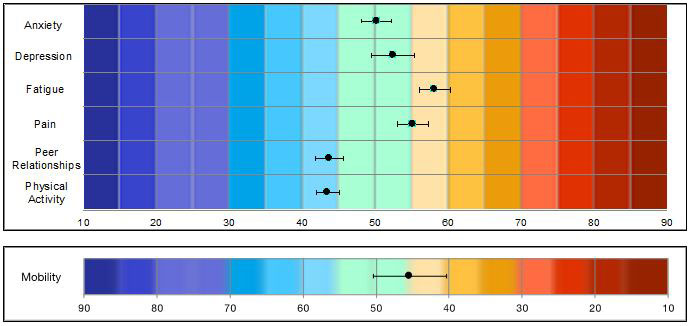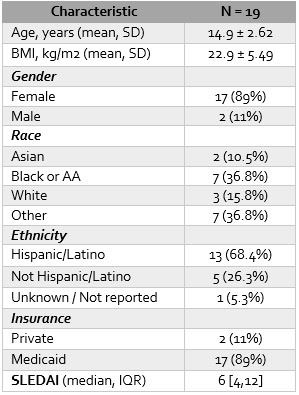Session Information
Date: Sunday, November 13, 2022
Title: Pediatric Rheumatology – Clinical Poster II: Connective Tissue Disease
Session Type: Poster Session C
Session Time: 1:00PM-3:00PM
Background/Purpose: The importance of patient-reported outcomes and health-related quality of life (HRQOL) is increasingly recognized in healthcare. Adults with Systemic Lupus Erythematosus (SLE) have poor HRQOL, which is associated with medication non-adherence and worse medical outcomes [1,2]. Studies suggest that young adults with SLE endorse having limited physical and social capabilities, however, there is a paucity of research regarding HRQOL in children with SLE [3, 4]. In this study we aimed to measure HRQOL in children with SLE, hypothesizing that those with worse HRQOL will have higher disease activity.
Methods: A convenience sample of 19 children with SLE were consecutively recruited between 8/20/2019 and 3/31/2022. Subjects completed the Patient global health assessment (PtGA) and pediatric Patient Reported Outcomes Measurement Information System (PROMIS) questionnaires [5]. PROMIS domains collected as both short forms (SF) and computer adaptive tests (CATS) were: Anxiety, Depression, Fatigue, Pain interference, Peer relationships, Physical activity, and Mobility; each having a mean of 50 and a standard deviation (SD) of 10 for the general population [6]. The treating physician completed the Physician global health assessment (PhGA) and Systemic Lupus Erythematosus Disease Activity Index (SLEDAI). Descriptive statistics was calculated. Using standard software, raw scores for PROMIS measures were converted to T-scores. Spearman’s correlations were performed with statistical significance set to p< 0.05.
Results: In our population, median SLEDAI was 6 [IQR 4,12] indicating overall moderate disease activity. All PROMIS domains were within 1 SD of the mean. All PROMIS SF and CATs for the same domain were strongly correlated (r ≥ 0.80, p< 0.01, Table 3). PhGA was strongly correlated with SLEDAI (r = 0.75, p=0.00038), but did not correlate with any PROMIS domains, aside from Peer Relationships. PtGA was strongly correlated with PROMIS Anxiety (r = -0.73, p = 0.00042), and moderately correlated with Depression (r = -0.62, p = 0.00476), Pain interference (r = -0.51, p = 0.025), Peer relationships (r = 0.48, p = 0.043), and Mobility (r = 0.56, p = 0.012), but was not correlated with additional PROMIS domains or SLEDAI (Table 2). SLEDAI was not correlated with any PROMIS measures
Conclusion: All PROMIS domains in our cohort were within 1 SD of the mean, suggesting that HRQOL in children with SLE does not significantly differ from the general population. The strong association between PROMIS SF and PROMIS CATS show that CATS are a reliable metric to assess HRQOL. The correlations between Anxiety, Depression, Pain Interference, and Mobility PROMIS domains with the PtGA suggest that the overall wellbeing of children with SLE may be particularly impacted by these four domains. There were no significant correlations between the PROMIS measures and SLEDAI nor PhGA, suggesting that HRQOL is not related to disease activity in this population. This study is limited by small sample size in a single center; additional research is needed to further characterize the HRQOL of children with SLE, including studies examining the drivers of high and low HRQOL as well as ways to improve HRQOL in this population.
*bolded R value signifies p<0.05
To cite this abstract in AMA style:
Samuels J, Issa R, Robinson L, Trachtman R. Health Related Quality of Life in Children with Systemic Lupus Erythematosus [abstract]. Arthritis Rheumatol. 2022; 74 (suppl 9). https://acrabstracts.org/abstract/health-related-quality-of-life-in-children-with-systemic-lupus-erythematosus/. Accessed .« Back to ACR Convergence 2022
ACR Meeting Abstracts - https://acrabstracts.org/abstract/health-related-quality-of-life-in-children-with-systemic-lupus-erythematosus/



